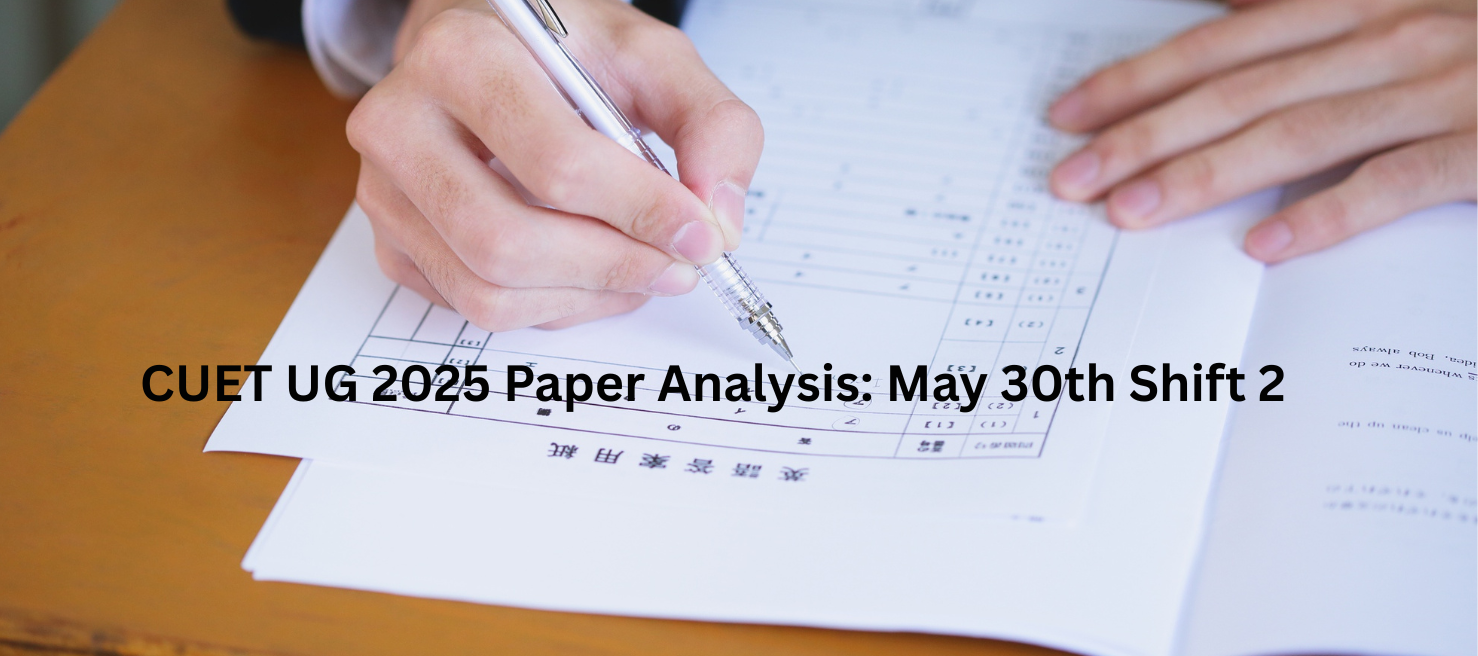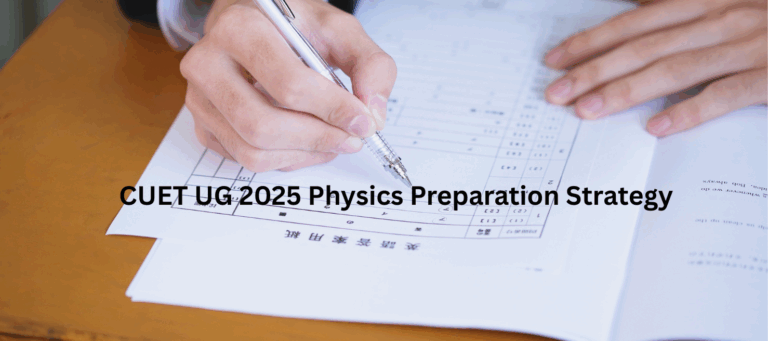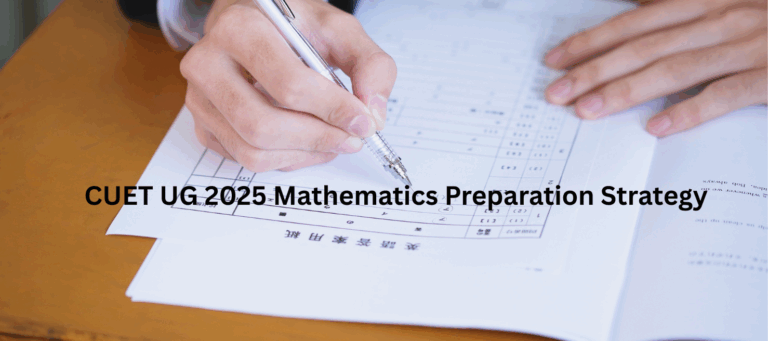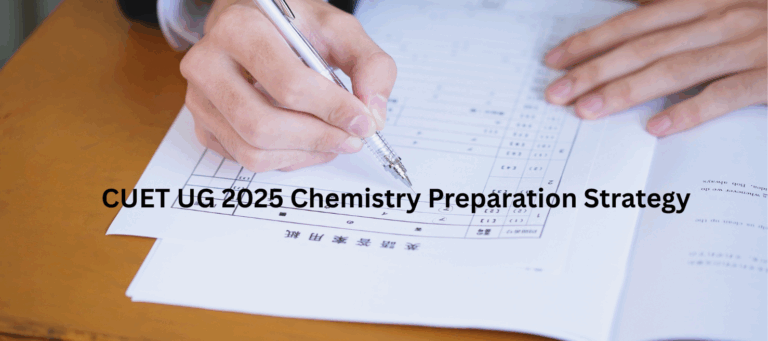Summarise With AI

The CUET UG 2025 exam for the May 30th Shift 2 concluded with students appearing for subjects, including General Aptitude Test (GAT), Economics, Accountancy, Physics, Mathematics, and Chemistry. This session saw a balanced mix of questions testing conceptual clarity, problem-solving skills, and application-based understanding. The General Aptitude section maintained its focus on reasoning, quantitative aptitude, and language skills, while the subject-specific papers covered core concepts with varying levels of difficulty.
In this detailed exam analysis of CollegeDost, we will explore the overall difficulty level, topic-wise weightage, tricky questions, and key highlights from each subject. This analysis aims to provide future aspirants with a clearer understanding of the exam pattern and help them strategise their preparation effectively.
- May 13th CUET UG Paper Analysis Shift 1
- May 13th CUET UG Paper Analysis Shift 2
- May 14th CUET UG Paper Analysis Shift 1
- May 14th CUET UG Paper Analysis Shift 2
- May 15th CUET UG Paper Analysis Shift 1
- May 15th CUET UG Paper Analysis Shift 2
- May 16th CUET UG Paper Analysis Shift 1
- May 16th CUET UG Paper Analysis Shift 2
- May 19th CUET UG Paper Analysis Shift 1
- May 19th CUET UG Paper Analysis Shift 2
- May 20th CUET UG Paper Analysis Shift 1
- May 20th CUET UG Paper Analysis Shift 2
- May 21st CUET UG Paper Analysis Shift 1
- May 21st CUET UG Paper Analysis Shift 2
- May 22nd CUET UG Paper Analysis Shift 1
- May 22nd CUET UG Paper Analysis Shift 2
- May 23rd CUET UG Paper Analysis Shift 1
- May 23rd CUET UG Paper Analysis Shift 2
- May 24th CUET UG Paper Analysis Shift 1
- May 24th CUET UG Paper Analysis Shift 2
- May 26th CUET UG Paper Analysis Shift 1
- May 26th CUET UG Paper Analysis Shift 2
- May 27th CUET UG Paper Analysis Shift 1
- May 27th CUET UG Paper Analysis Shift 2
- May 28th CUET UG Paper Analysis Shift 1
- May 28th CUET UG Paper Analysis Shift 2
- May 29th CUET UG Paper Analysis Shift 1
- May 29th CUET UG Paper Analysis Shift 2
- May 30th CUET UG Paper Analysis Shift 1
- May 31st CUET UG Paper Analysis Shift 1
- June 2nd CUET UG Paper Analysis Shift 1
- June 2nd CUET UG Paper Analysis Shift 2
- June 3rd CUET UG Paper Analysis Shift 1
- June 3rd CUET UG Paper Analysis Shift 2
CUET UG 2025 Exam Overview
Below is the exam overview of CUET UG 2025.
| Exam Particulars | Exam Details |
| Total Subjects Offered | 37 (13 Languages + 23 Domain Subjects + 1 General Aptitude Test) |
| Medium | 13 Indian languages (Assamese, Bengali, English, Gujarati, Hindi, Kannada, Malayalam, Marathi, Punjabi, Odia, Tamil, Telugu, and Urdu) |
| Subjects to Choose | Up to 5 subjects |
| Total Marks of CUET Exam | 250 |
| Questions per Subject | 50 Compulsory Questions |
| Marking Scheme | +5 for correct answer, -1 for incorrect answer, and no marks for unattempted questions |
| Exam Mode | CBT Mode |
| Duration | 60 minutes per subject |
Where To Check CUET UG 2025 Paper Analysis
Hey there! If you’re looking for a reliable and detailed CUET UG 2025 Exam Analysis for various subjects, CollegeDost is your go-to platform. Click on the link below to access all the CUET exam analyses from May 13th till now.
👉 Check CUET UG 2025 Exam Analysis on CollegeDost
CollegeDost brings you a comprehensive and up-to-date exam review, topic-wise difficulty breakdowns, and expert insights straight from students and educators. Whether you want to understand the question trends or plan your next steps, CollegeDost has got you covered with accurate and easy-to-understand analysis to stay ahead in your CUET preparation journey.
CUET UG 2025 Exam: Shift Timings Today
Check the CUET UG 2025 exam shift timings in the table below.
| CUET UG 2025 Slot Time for 30th May | Reporting Time | Gate Closing Time | Shift Timing |
| CUET UG 2025 Shift 1 | 7 AM | 8.30 AM | 9 AM to 12 PM |
| CUET UG 2025 Shift 2 | 1 PM | 2.30 PM | 3 PM to 6 PM |
CUET Exam Pattern 2025
The CUET UG 2025 exam is structured to assess various skills across multiple subjects. Below is a detailed breakdown of the exam pattern:
| Sections | Subjects / Tests | No. of Questions | Question Type |
| Section IA | 13 different languages (any one can be chosen) | 50 | Reading Comprehension based on different types of passages – Factual, Literary, and Narrative; includes Literary Aptitude and Vocabulary |
| Section II | 23 domain-specific subjects (choose as per eligibility) | 50 | MCQs based on the NCERT Class XII syllabus |
| Section III | General Test (for programs where it’s used for admission) | 50 | General Knowledge, Current Affairs, General Mental Ability, Numerical Ability, Quantitative Reasoning (up to Grade 8 level), Logical and Analytical Reasoning |
CUET UG 2025 Exam Analysis: Based on the Number of Attempts
Candidates can check the number of good attempts that they can expect in the exam from the following table.
| CUET UG Subjects | Difficulty Level | Good Attempts |
| General Aptitude Test | Difficult (Compared to the other shifts) | 35+ |
| Economics | Easy to Moderate | 48 |
| Accountancy | Easy to Moderate | 40-45 |
| Physics | Easy | 40+ |
| Chemistry | Easy | 45+ |
| Mathematics | Moderate to Difficult | 35-40 |
CUET UG 2025 Exam Analysis: May 30 2025, Shift 2
The CUET exam date 2025 of May 30th, shift 2, for the General Aptitude Test, Economics, Accountancy, Physics, Chemistry, and Mathematics paper. As per the students’ initial reaction, the exam for the Shift 2 is considered easy to moderate. Check out the subject-specific analysis and weightage of each chapter.
CUET UG 2025 GAT Paper Analysis
Students found the Quant & Reasoning section to be standard and manageable, with 35–40 questions focused on familiar topics like Arithmetic, Mensuration, Compound Interest, and Time & Work. Reasoning questions were typical, covering blood relations, directions, and coding-decoding. However, as per the students, the GK/GS section, with 10–12 questions, included a mix of current affairs and static GK. Students recalled repeated topics like Tessy Thomas, Make in India, and the Classical Language status of Marathi. Many found the paper balanced, with no surprises, and well-aligned with their preparation.
| Sections | Topics Covered | Details |
| Quant & Reasoning | Arithmetic, Mensuration, Volume, Compound Interest, Profit & Loss, Time & Work, Probability, Mean/Median/Mode, Algebra (Linear Eq.), Geometry (limited), Statistics, Coordinate Geometry, Parallelogram, Height & Distance | 35–40 questions; mostly standard; topics like CI, Time & Work were direct; no unusual patterns |
| Reasoning: Blood Relation, Direction Sense, Missing Numbers, Clock, Coding-Decoding | 15 questions; traditional reasoning types covered | |
| GK/GS | History (Akbar, Shah Jahan), Static GK, Current Affairs, Geography, Science | 10–12 questions; covered topics like Classical Language (Marathi), Make in India, Colloids |
| Miscellaneous GK: Missile Woman (Tessy Thomas), Manchester of India (Ahmedabad), Nobel 2024 (Nihon Hadyanko), Longest Boundary (Bangladesh – 4096 km), Slash & Burn Agriculture (Kumara, Khil, Jhum) | Blend of static and recent topics; some repeat questions from earlier papers |
General Awareness-Chapterwise Weightage
The table below highlights the importance and distribution of different subjects within the General Awareness subject.
| Category | Expected Questions |
| Geography | 7 |
| Science | 4 |
| Personalities | 4 |
| Polity | 3 |
| Defence | 2 |
| Awards | 2 |
| Sports | 1 |
| Currency | 1 |
| Miscellaneous | 1 |
Logical reasoning-Chapterwise Weightage
| Topic | Expected Questions |
| Visual Reasoning | 4 |
| Series | 2 |
| Coding-Decoding | 2 |
| Arrangement | 2 |
| Clocks | 2 |
| Analogy | 1 |
| Family Tree | 1 |
| Calendar | 1 |
| Data Sufficiency | 1 |
| Directions | 1 |
| Statement-Conclusion | 1 |
Numerical Ability-Chapterwise Weightage
| Topic | Expected Questions |
| Time and Work | 2 |
| Ratio | 2 |
| Simplification | 1 |
| Fractions | 1 |
| HCF-LCM | 1 |
| Problems on Age | 1 |
| Percentage | 1 |
| Profit, Loss & Discount | 1 |
| Simple Interest | 1 |
| Area | 1 |
| Volume | 1 |
| Speed, Time, Distance | 1 |
| Mean & Mode | 1 |
| Triangle | 1 |
| Trigonometry | 1 |
CUET UG 2025 Economics Paper Analysis
Students found the Economics paper to be balanced and of easy to moderate difficulty. The split between Microeconomics and Macroeconomics was equal, with most students attempting around 48 out of 50 questions. As per the student’s report, in Microeconomics, familiar topics like Adam Smith, cost curves, and price determination in perfect competition made the section comfortable, though Consumer Equilibrium was missing. However, Macroeconomics featured matching questions from BOP and FER, along with a couple of numericals from ADS and the Consumption Function. Many students appreciated the case study-based approach and felt the paper tested both conceptual clarity and application.
| Sections | Topics Covered | Key Details |
| Overall Paper | Microeconomics (50%), Macroeconomics (50%) | Easy to Moderate; ~48/50 questions attempted; 2 case studies (1 from each section) |
| Sequence-Based Questions | 2–3 sequence-based questions | |
| Microeconomics | Introduction (Adam Smith), Cost Curves (MC, AC, AVC), Producer Equilibrium (MC=MR), Perfect Competition (Price Determination) | Featured matching and diagram-based questions; Consumer Equilibrium not asked |
| Macroeconomics | Foreign Exchange Rate (FER), Balance of Payments (BOP), Aggregate Demand & Supply (ADS), Consumption Function | BOP and FER had matching questions; 2 numericals from ADS and Consumption Function |
| National Income | Minimal to no questions reported |
CUET Economics Chapterwise Weightage
The table below highlights the importance and distribution of different subjects within the Economics subject.
| Chapter/Topic | Number of Questions |
| Consumer Behavior and Demand | 6–7 |
| Introductory Microeconomics | 2 |
| Balance of Payments | 4–5 |
| Government Budget and the Economy | 3–4 |
| Determination of Income and Employment | 3–4 |
| National Income | 3–4 |
| Money and Banking | 2–3 |
| Rural Development | 4–5 |
| Indian Economy (1950–1990) | 2–3 |
| Infrastructure | 2–3 |
| Development Experiences of India (Comparison with Neighbors) | 2–3 |
| Indian Economy on the Eve of Independence | 1–2 |
| Economic Reforms since 1991 | 1–2 |
CUET UG 2025 Accountancy Paper Analysis
Students found the paper to be balanced and of easy to moderate difficulty, with an equal mix of theory and numerical questions. Topics like Gaining/Sacrificing Ratio, Admission, and Goodwill were reported to appear in the exam, but Dissolution and P&L Appropriation were skipped. However, Share Capital questions were straightforward, covering allotment, forfeiture, and reissue, with frequent Match the Column formats. Moreover, students found that Debentures had questions on discount and capital gain/loss, but didn’t cover the types. Students noted that Financial Statements and Accounting Ratios required logical thinking, while the Cash Flow section had just one easy numerical calculation. Overall, the paper aligned well with expectations and prep.
| Sections | Topics Covered | Key Details |
| Overall Paper | Balanced mix of Theory and Numericals (50–50) | Easy to Moderate level; no case studies in any section |
| Partnership Accounting | Gaining & Sacrificing Ratio, Admission of Partner, Interest on Drawings, Goodwill (All Methods), Retirement/Death | No questions on Dissolution, Realisation A/c, Guarantee of Profit, or P&L Appropriation |
| Share Capital | Application, Allotment, First & Final Call, Forfeiture, Reissue, Capital Reserve | Match the Column questions included; no case study |
| Debentures | Discount on Issue, Capital Gain/Loss, Business Purchase-related questions | Types of Debentures not asked |
| Financial Statement Analysis | Sequencing items in Balance Sheet, CA & CL Calculation | Focused on logical order and basic computation |
| Accounting Ratios | 3 MCQs asked | Some found them tricky |
| Cash Flow Statement | 1 Numerical on Investing Activity | No activity-type identification questions |
CUET Accountancy Chapterwise Weightage
The table below highlights the importance and distribution of different subjects within the Accountancy subject.
| Topics | Number of Questions |
| Reconstitution of Partnership | 10–12 |
| Analysis of Financial Statements | 7–8 |
| Accounting for Share and Debenture Capital | 6–7 |
| Accounting – Not for Profit | 5–6 |
| Computerized Accounting System | 4–5 |
CUET UG 2025 Physics Paper Analysis
Students found the Physics paper to be mostly consistent with previous shifts and easier than the morning slot, which had more tricky questions. Most were able to attempt 35–40 questions confidently. Students found that topics like Ray Optics and Moving Charges & Magnetism were given more weight, while Modern Physics saw fewer questions. Around 10–12 questions were direct and formula-based, making them scoring for those clear with concepts, though a few questions had subtle twists that required careful reading.
| Aspects | Details |
| Overall Pattern | Consistent with previous shifts, less tricky than the morning shift |
| Attempted Questions | Most students attempted 35–40 questions |
| High-Weightage Topics | Ray Optics, Moving Charges & Magnetism |
| Other Topics Covered | Semiconductors, Modern Physics (a few questions) |
| Question Type | 10–12 formula-based questions; some had conceptual twists requiring careful interpretation |
CUET Physics-Chapterwise Weightage
The table below highlights the importance and distribution of different subjects within the Physics subject.
| Chapter | Number of Questions |
| Physical World & Measurement | 1–2 |
| Kinematics | 1–2 |
| Laws of Motion | 2–3 |
| Work, Energy, and Power | 2–3 |
| Motion of a System of Particles & a Rigid Body | 2–3 |
| Gravitation | 1–2 |
| Thermodynamics | 2–3 |
| Kinetic Theory | 1 |
| Oscillations and Waves | 2–3 |
| Mechanical Properties of Solids & Fluids | 1–2 |
| Electrostatics | 2–3 |
| Current Electricity | 2–3 |
| Magnetic Effects of Current & Magnetism | 2–3 |
| Electromagnetic Induction | 2 |
| Alternating Current | 1–2 |
| Electromagnetic Waves | 1 |
| Ray Optics and Optical Instruments | 2–3 |
| Wave Optics | 1 |
| Dual Nature of Matter and Radiation | 1–2 |
| Atoms and Nuclei | 2–3 |
| Semiconductor Electronics | 2–3 |
| Communication Systems | 1 |
CUET UG 2025 Chemistry Paper Analysis
Students found the Chemistry section to be broad in coverage, with a strong emphasis on Organic and Physical Chemistry. Organic questions focused on topics like IUPAC of Metacresol, Swarts Reaction, and SN2 in aryl halides, which many students found manageable. However, Physical Chemistry included scoring questions on boiling point, basic nature, and molality. Match the Column formats that appear in biomolecules and amino acids. Overall, students felt the paper was balanced but required clarity in fundamentals to handle the mix of direct and conceptual questions.
| Category | Topics Covered |
| Major Focus Areas | Organic Chemistry, Physical Chemistry |
| Organic Chemistry | IUPAC of Metacresol, Swarts Reaction, Azo Coupling, SN2 in Aryl Halide |
| Physical Chemistry | Formula of Freon, Boiling Point (2 Qs), Basic Nature (2 Qs), Henry’s Law, Molality |
| Miscellaneous Topics | Hybridisation, Uracil (Biomolecules), Amino Acids (Match the Following) |
CUET Chemistry-Chapterwise Weightage
The table below highlights the importance and distribution of different subjects within the Chemistry subject.
| Topics | Number of Questions |
| Solid State | 4 |
| Electrochemistry & Solutions | 5 (Case study – Slightly difficult) |
| Chemical Kinetics | 2–3 |
| P Block Elements | 2–3 |
| D and F Block Elements | 5 (Case study – Easy) |
| Coordination Compounds | 5–6 (Moderately difficult) |
| Alcohols, Phenols, and Ethers | 4–5 |
| Aldehydes, Ketones, and Carboxylic Acids | 3–4 |
| Organic Compounds Containing Nitrogen | 4 |
| Polymers | 1–2 |
| Chemistry in Everyday Life | 1–2 |
CUET UG 2025 Mathematics Paper Analysis
Students found the Maths paper moderately difficult, mainly due to its length and complex calculations. There was a heavy focus on Calculus, especially topics like Application of Derivatives, Integration, and Differential Equations. Many students noted 4–5 questions from Linear Programming and appreciated the predictable weightage. However, there were questions on Parabola, Dot & Cross Product, and Type of Relation also appeared, while Matrices & Determinants had minimal presence. Overall, the paper demanded strong conceptual clarity and time management.
| Category | Topics Covered |
| Overall Difficulty | Moderate due to lengthy and complex questions |
| High-Weightage Topics | Calculus, Integration, Application of Derivatives, Differential Equations |
| Key Questions | Linear Programming (4–5 Qs), Application of Integration, Increasing/Decreasing |
| Other Topics | Parabola, Dot & Cross Product, Type of Relation |
| Less Focused Topics | Matrices & Determinants |
CUET Mathematics-Chapterwise Weightage
The table below highlights the importance and distribution of different subjects within the Mathematics subject.
| Topics | Number of Questions |
| Linear Programming | 2 |
| Differentiation | 2 |
| Area Under Curves | 1 |
| Probability | 2 |
| Integration | 2 |
| Differential Equations | 1 |
| Application of Derivatives | 2 |
| Matrices | 2 |
| Determinants | 1 |
| Core Maths | 4 |
Student Reviews For CUET UG 2025 May 30th Shift 2 Exam
Most students from different states found CUET UG 2025 Shift 2, which was held on May 30th, to be easy to moderate. Here is a summary of what students perceived about the exam.
General Aptitude Test (GAT):
Students’ Feedback: “GAT was moderate in difficulty. The reasoning questions were straightforward, but the quantitative aptitude section required quick calculations. The language part was mostly based on vocabulary and reading comprehension, which was manageable.”
Economics
Students’ Feedback: “The Economics paper was conceptually clear but had some tricky application-based questions on micro and macroeconomics. Overall, it tested our understanding well but wasn’t too time-consuming.”
Accountancy
Students’ Feedback: “Accountancy was a bit challenging, especially the questions on journal entries and ledger posting. However, questions from basic accounting principles were easier and scored.”
Physics
Students’ Feedback: “Physics was moderately tough, with a good mix of numerical problems and theory-based questions. The questions from mechanics and electromagnetism were more detailed, so time management was key.”
Chemistry
Students’ Feedback: “Chemistry had balanced questions from physical, organic, and inorganic topics. The numerical problems in physical chemistry required focus, but the theoretical questions were direct.”
MathematicsStudents’ Feedback: “Mathematics was a bit lengthy, but doable. Most questions were from algebra and calculus, with some tricky ones on coordinate geometry. Speed and accuracy played a big role here.”
CUET UG 2025 Exam Day Guidelines
Given below are a few CUET UG 2025 exam day guidelines that students need to follow.
- Carry Only Required Items: Only take your printed admit card (with passport-size photograph), your valid photo ID (Aadhaar or PAN card), a transparent ballpoint pen, and a transparent water bottle. Candidates can check all the CUET exam details on the admit card and are advised to adhere to the instructions.
- Be On Time: Report to the exam center well in advance relative to your reporting time (7:00 AM for Shift 1 and 1:00 PM for Shift 2). If you are late, you will not be allowed to enter.
- Prohibited Items: Do not bring mobile phones, smart watches, electronic devices, bags, books, or food if not medically required (with documentation).
- Maintain Discipline: Be seated in your assigned seat, only do rough work on the sheets provided, and do not perform any unfair practice or make any noise in the exam hall.
- Time Management: It is a critical challenge across subjects, especially with lengthy sections like RC or Quant. It’s advised to tackle easy questions first.
- The Normalisation Factor: This factor will account for variations in difficulty across shifts. The focus should be on attempting as many questions with 100% accuracy.
CUET Dress Code For Females
| Category | Allowed | Not Allowed |
| Clothing | Half-sleeved, simple kurtis/tops | Full-sleeved, heavily embroidered, or layered clothing |
| Bottom Wear | Simple leggings, trousers, salwar | Skirts, jeans with extra pockets |
| Footwear | Slippers, flat sandals | Heels, closed-toe shoes, boots |
| Accessories | None | Jewelry (earrings, rings, bangles, bracelets, belts) |
| Electronic Items | None | Smartwatches, Bluetooth devices, and wired accessories |
CUET Dress Code 2025 for Males
| Category | Allowed | Not Allowed |
| Clothing | Half-sleeved, plain shirts or t-shirts | Full-sleeved shirts, layered clothing, and embroidery |
| Bottom Wear | Light trousers, simple jeans | Cargo pants, jeans with too many pockets |
| Footwear | Slippers, sandals | Shoes, sneakers, boots |
| Accessories | None | Watches, belts, caps, sunglasses, metallic items |
| Electronic Items | None | Smartwatches, Bluetooth devices, and wired accessories |
Things Allowed Inside the Examination Hall
- Transparent Water Bottle
- Admit Card (printed copy)
- Face Mask & Gloves (if applicable)
- Personal Hand Sanitiser (50 ml)
- Rough Sheets (provided by the exam centre)
- Passport-size Photograph (same as uploaded in the application)
- Simple Black/Blue Ballpoint Pen (if specified)
- Valid Photo ID Proof (Aadhar, PAN, Passport, etc.)
Things Not Allowed Inside the Examination Hall
- Books, Notes, or Any Study Material
- Mobile Phones & Smartwatches
- Wallets, Handbags, Sunglasses
- Bags, Pouches, or Any Items with Metal Components
- Electronic Gadgets (earphones, calculators, etc.)
- Jewellery, Caps, or Hats
- Food or Drinks (except water)
- Any Written or Printed Papers
What’s New In CUET UG 2025?
Check out some new changes introduced by UGC and which will be implemented from CUET UG 2025 onwards.
- Students can now take CUET UG exams in any subject, regardless of their Class 12th subjects.
- CUET UG will be conducted solely in CBT mode.
- CUET subjects have been reduced to 37 from 63. Teaching Aptitude, Entrepreneurship, and Legal Studies subjects has been removed.
- The duration of the test is 60 minutes for all the subjects.
- The GAT scores will decide the admission for the removed CUET subjects.
- There will be no optional questions.
Frequently Asked Questions
1. What was the overall difficulty level of the Physics paper on CUET UG 2025 May 30th Shift 2?
Students found the Physics paper to be consistent with previous shifts and easier than the morning slot. The difficulty level was rated easy to moderate, with most students attempting 35 to 40 questions.
2. Which topics were given more emphasis in the Physics section in shift 2 of CUET UG 2025?
Ray Optics and Moving Charges & Magnetism were given significant weightage. A few questions also came from Semiconductors, while Modern Physics had very limited representation.
3. What was the nature of the CUET UG 2025 Physics questions?
About 10 to 12 questions were formula-based, providing scoring opportunities for conceptually strong students. However, a few questions had subtle twists that required careful reading and interpretation.
4. How was the Economics paper structured in the shift 2 of CUET UG 2025?
The Economics paper was evenly divided between Microeconomics and Macroeconomics. Students typically attempted around 48 out of 50 questions and found the overall difficulty to be easy to moderate.
5. What were the major topics covered in Microeconomics and Macroeconomics of CUET UG 2025?
Microeconomics included questions on Adam Smith, cost curves, and price determination under perfect competition. Macroeconomics featured matching questions on Balance of Payments and Foreign Exchange Rate, as well as numericals on Aggregate Demand and the Consumption Function.







